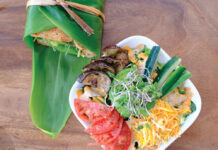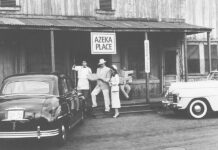Shannon Wianecki
 Any Maui visitor who’s done his homework knows to visit T. Komoda Store & Bakery in Makawao. The bakery’s legendary cream puffs top everyone’s must-try list—tourists and kama‘aina alike. Before the store opens at 7 a.m., a line stretches alongside the weathered building; by 10 a.m. the baker’s racks inside are empty. Early birds have made off with tidy boxes brimming with the coveted cream puffs, irresistible stick donuts, chocolate-smeared long johns, fruit pies, and Chantilly cakes. Latecomers must content themselves with whatever is left—maybe just a tee shirt to prove they were there.
Any Maui visitor who’s done his homework knows to visit T. Komoda Store & Bakery in Makawao. The bakery’s legendary cream puffs top everyone’s must-try list—tourists and kama‘aina alike. Before the store opens at 7 a.m., a line stretches alongside the weathered building; by 10 a.m. the baker’s racks inside are empty. Early birds have made off with tidy boxes brimming with the coveted cream puffs, irresistible stick donuts, chocolate-smeared long johns, fruit pies, and Chantilly cakes. Latecomers must content themselves with whatever is left—maybe just a tee shirt to prove they were there.
The crowds keep coming, despite head-on competition from Krispy Kreme, an internationally popular bakery chain that parked itself just outside Kahului Airport. How does little old family-run Komoda Store maintain its pull? Well, the owners might never spill the cream-puff recipe, but they do reveal how they’ve run a thriving business for ninety-two years and counting. It’s not a formula easily replicated.
Takezo Komoda opened the family business in 1916, just after the birth of his son Takeo. Originally it was a restaurant, not a bakery, on the corner of Makawao Avenue and Olinda Road, where Polli’s Mexican Restaurant is today. Komoda and his wife, Shigeri, raised six boys and two girls there. Each took a turn selling sandwiches and saimin to paniolos (cowboys) and plantation workers. The family made their own bread and donuts from the bread dough—the precursor to today’s stick donuts. When the Marines moved into town during WWII, Shigeri sold them bread and guava jelly for five cents. “They came and ate saimin and stew in the back,” says Shigeri’s granddaughter, Betty Shibuya.
The business eventually moved across the street to its current Baldwin Avenue location and Takeo took over. But it wasn’t until 1947, when Takeo’s brother Ikuo returned from baking school, that the business found its true destiny as a bakery and general store. Ikuo came home from Minneapolis with pastry recipes in tow. He claims there’s nothing secret about them. “It’s the same thing as other bakeries,” he says. “Nothing different.”
But the coconut wireless buzzed with a different story: “Komoda’s cream puffs are some ono [delicious]!” Soft pastry shells laden with thick, sweet cream quickly became the favorite omiyage, or souvenir, from Maui.The business hasn’t changed much since. Takeo Komoda, now ninety-two, and his wife, Kiyuko, eighty-seven, live on-site in his parents’ former home. Chief baker Ikuo, in “semi-retirement” at seventy-eight, still puts in eight hours a day, as does his younger brother, Dan. As the years pass, the lines out the door remain consistent. Aside from baked goods, the store’s shelves are stocked with convenience items: groceries, toiletries, fishing gear, and the island’s best road map. In the kitchen, fresh newspapers line the donut fryer. Opposite the fryer stands the bakery’s only stove—a four-burner Wolf. It’s a humble powerhouse, much like its operators, and cranks out up to 130 quarts of cream-filling a day. The equipment that gives evidence of the bakery’s true volume is the oven: at least fifteen feet tall, with six rotating racks, it fills the kitchen’s entire back wall, and can handle seventy-two-dozen cream-puff shells at once. Luckily for pastry lovers everywhere, when the older generation grew ready to pass the torch, Betty and her husband, Calvin Shibuya, took it. After retiring from the Air Force, Calvin, an aeronautical engineer, gave up dreams of being an astronaut and tied on an apron as store manager and baker.
“I thought it would be a devastating thing to shut down the business,” says Shibuya, “so I decided to come back and help out.”
By “help out,” he means regularly clocking fifteen-hour days, baking through the night. “My hours are horrendous,” he laughs. Still, on his days off, a spry and muscular Shibuya enjoys running marathons—must be that military training.
A baker’s life is no cakewalk: long hours on your feet and twice the workload on holidays. To ease the grueling schedule, Shibuya began closing the store early on Saturdays, since, after the early rush, “half the pastries were gone and we’d be here twiddling our thumbs.” He also closed on Wednesdays. But the staff’s real rest comes twice a year: three weeks of paid vacation. The sign on the door says “Closed for renovations.” This refers to the workers’ bodies and well-being, rather than the building. Shibuya offers employees the best health insurance he can find—a wise choice, considering many are pushing seventy years of age and nearly all are in the family.
“Working environment is so important in your production,” says Shibuya. “If everybody is happy and can joke, talk story, production is so much better. And that’s what we have.
“When I hire people I say they’re going to have to be part of the family,” he continues. “I have one outsider, Shirley, a baker’s assistant. She’s in her seventies. I brought her back from retirement; her replacements just couldn’t fit in. Out of desperation, I went to her and asked her if she wanted to come back. And she did. Bless her heart. That’s why I like the old-timers. They still have that sense of responsibility, dedication, and loyalty.”
For Ikuo, it’s less about shouldering responsibility and more about his coworkers’ company. “We have some crazy ones,” he laughs. He has no plans for retiring any time soon. “I don’t want to stay at home,” he says. “No sense just sitting around. There’s no fun it that. My wife wants to work too.” Leatrice pitches in on Fridays and Saturdays.
During busy holidays like Christmas and Mother’s Day, it’s all hands on deck. Younger family members join the old-timers, even flying in from O‘ahu and Las Vegas to help out. Three generations form the bakery’s assembly line, including Betty and Calvin’s daughters, the great-grandchildren of the founder.
“Everybody has their own job,” says Shibuya, “decorating cakes, making stick donuts, and helping customers. It’s a pleasant gathering. It’s nice to get together as a family.”
While most families’ reunions probably don’t include mixing 200 pounds of donut dough, it seems to work for this one. On busy Saturdays, 125-dozen cream puffs and just as many stick donuts fly out the door. Customers order the chocolate Chantilly cake—the most popular flavor by far—for baby lu‘aus and birthdays.
Will this beloved business see its 100th birthday?
“Everything’s predicated on personal health,” says Shibuya. “As long as people can stay healthy and are willing to work, we might make it.”
“In Makawao, we’re the only mom-and-pop still in existence,” he says. “We’re the survivors.”
Last August, Shibuya was named Volunteer of the Year for his work with the Makawao Main Street Association, an organization seeking to revitalize and protect the small-town ambiance. “It’s so important to keep the old towns alive,” says Shibuya. “This is the fiber of our history. This is where it all started. Pu‘unene, where I was born, is no more, and that’s sad. I don’t want to see that happen to Makawao.”
For now, Makawao is still a happening spot—thanks in part to the Komodas and Shibuyas. Drop by any Friday night and you’ll likely see paniolos bellying up to the bar at Polli’s or Casanova’s, just like the old days. Long after the bar-goers have gone to bed, the Komoda bakers will be busy whipping up Saturday morning’s cream puffs.
Get them while you can.





